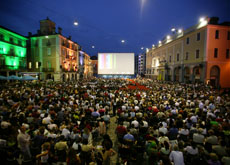Experts predict bright future for Swiss films

The quality of Swiss wares currently tempting international buyers at the Locarno Film Festival is greater than ever, according to industry insiders.
After steady improvements over the past decade, the share of Swiss productions in the national market climbed in the first quarter of 2006 to an unprecedented high of 16 per cent – up from six per cent for all of 2005.
“At the moment Swiss films are booming at home and we need to make sure that they are noticed abroad as well,” Micha Schiwow, head of the national film promotion organisation Swiss Films, told swissinfo.
“That’s not that easy as those films which do well in Switzerland often aren’t conceived with foreign markets in mind.”
Of the four Swiss films in 2005 to attract more than 100,000 cinema goers (Vitus, My Name is Eugen, Grounding and Handyman), only Vitus has had reasonable success abroad.
Nadia Dresti, head of the industry office at the festival, which concludes on Saturday, also believes Swiss cinema is “healthier than ever”.
“We had years when Swiss films weren’t that commercial, but this year the film in competition – Das Fräulein by Andrea Staka – has a buzz, everyone’s talking about it,” she told swissinfo.
“I sent the agents to see it not because it’s a Swiss film but because it’s a good film.”
Pioneer
There are various theories why success has been slow to arrive. While some think Switzerland’s unique trilingual set-up results in rich cultural diversity, others blame it for a fragmented market.
“[The language issue] is not a disadvantage,” Schiwow said. “I think we’re a pioneer for Europe because we’re used to watching films with subtitles.”
“Here at Locarno films are shown in several versions with different subtitles and that is absolutely accepted. I’ve never heard of the public complaining that a film is shown without Italian or French subtitles.”
Schiwow believes this could be a “dream” to work towards for other European countries, where currently this certainly is not the case.
“In France, for example, it’s almost inconceivable for a film to be shown with English subtitles. In Germany they might accept English subtitles but certainly not French ones…”
Dresti agrees that subtitles don’t hinder a film’s chances. “I wouldn’t say it’s a question of language but rather of style and of content,” she said, pointing to German comedy-drama Good Bye Lenin!, which had worldwide success in 2004.
Integration
At a news conference in Locarno on Friday, Aki Kaurismäki, subject of this year’s Retrospective, was asked jokingly by his fellow Finnish director Peter von Bagh what it felt like to be outside the European Union.
Kaurismäki’s reply – “I’m just glad to be outside that mini-bar” – will probably not go down as great geopolitical wisdom, but von Bagh’s question addressed another issue which many consider central to the Swiss film industry’s woes.
Since April 1, however, Swiss film professionals have been able to participate in the EU’s Media programme, which aims at strengthening the competitiveness of the European audiovisual industry by supporting development, distribution, promotion and training.
“The advantage of being in this programme is that we can link and network better with other countries, so the number of co-productions will probably increase – up to now it was never particularly attractive to make a film with Switzerland because you wouldn’t get any funding support from the Media programme,” Schiwow said.
“On the other hand, when it comes to distribution and marketing, I have the slight concern that our films aren’t quite strong or popular enough to benefit from the funding.”
Schiwow explained that in order to get support from the Media programme, films have to be running in eight European countries at the same time – “and none of our films do that. Vitus made it to 15 countries around the world – half of which were in Europe – but not at the same time”.
swissinfo, Thomas Stephens in Locarno
The Locarno International Film Festival was founded in 1946. It is held in August and is attended by around 90,000 visitors and up to 4,000 professionals. The main award is the Golden Leopard.
The system of public funding for the Swiss cinema, covering all stages of the production and promotion of a film, depends on credits allocated by parliament. This was set at about SFr23 million ($18 million) for 2004-2007.
The remainder, SFr12-15 million, comes directly from the Federal Culture Office’s cinema section.
The 59th Locarno International Film Festival is taking place from August 2-12.
In 2005 Switzerland made 16 feature films, 34 documentaries, 209 short films (of which 40 were animated).
383 films made it to Switzerland’s 323 cinemas (and 537 screens) of which 49 were Swiss, 99 American and 172 European. Swiss market share was 6.58%.
14.9 million tickets were sold (an average of two per Swiss) for a box office of SFr314.3 million.
Between 1995 and 2004 two-thirds of Swiss films attracted fewer than 5,000 viewers and a third fewer than 1,500. The Piazza Grande at Locarno sells out to 8,000.

In compliance with the JTI standards
More: SWI swissinfo.ch certified by the Journalism Trust Initiative












You can find an overview of ongoing debates with our journalists here . Please join us!
If you want to start a conversation about a topic raised in this article or want to report factual errors, email us at english@swissinfo.ch.